- Home
- Sebastian Faulks
Human Traces Page 15
Human Traces Read online
Page 15
She stood up, holding her hand across her trembling lip, and left the room with a rustle of silk. Her father and her husband grimaced at one another and at the closed door.
Their excursion over, Thomas was cupping his hands to make a foothold for Daisy, so that she could pull herself up onto the top of the brewery gate. Twice she lost her balance and fell off, giggling; at the third attempt, she secured a handhold and hauled herself up, scrabbling at the wooden doors with her boots. Thomas himself was able to reach the top without help.
‘I’ll see you by the ice-house,’ he whispered to Daisy. ‘Are you all right?’ he called after she had dropped down inside the walls.
‘Yes.’
He walked up to the main gate and hammered at the window of the small lodge. ‘Don’t say anything about this, Patterson,’ he said, ‘and I won’t report you for being asleep.’
Patterson blinked several times, manifestly wondering how Thomas could be coming back when he had not gone out. Thomas ran down to the ice-house, where Daisy was waiting.
‘The doors are barred inside at ten,’ he said, ‘so we shall have to climb the drainpipe at the back. I wedged the casement open on the first floor landing, so we can get in there.’
Daisy gripped his arm. ‘Listen,’ she said, ‘I must be the first lunatic to break into an asylum.’
It was decided by Dr Faverill that in December the patients should have a ball. At the morning meeting in his office, he set out his plan to the staff.
‘It is my intention that we should invite observers from outside, representatives of the Committee ofVisitors, county councillors, the gentlemen of the press. They must be allowed to see how well our little society functions. I appreciate that all this will entail considerable preparation and, on the night itself, some vigilance.’
Faverill looked round the faces in the room: McLeish sceptical but silent; Tyson and Miss Whitman exchanging worried glances; Matilda, rocking; Stimpson, puzzled, smelling of the pharmacy; and Thomas, tired but eager. It was not a difficult choice.
‘Dr Midwinter, I should like you to take charge of the preparations. I can make a small sum of money available to you, though most of the decorations, the refreshment and so forth will be home-made.’
‘I understand, sir,’ said Thomas.
‘As for music,’ said Faverill, ‘Mr McLeish, I believe that the asylum band is ultimately under your control. Please ensure that the conductor has a suitable programme and that they are well rehearsed.’
‘Yes, sir. Tell me, where exactly do you envisage the revels taking place?’
‘The central hall. What used to be the dining room.’
‘It’s not been used these ten years, since we started to feed them in the wards.’
‘Well, ask Grogan to set to work. Detail some men from the farm to help. Clear it up and paint it. They should enjoy doing that.’
‘I see,’ said McLeish. ‘And what sort of numbers had you envisaged? And what manner and degree of affliction would you consider appropriate amongst the revellers?’
‘I suppose we could manage two hundred patients. As to which ones, I imagine there will have to be a degree of selection.’
‘Aye.’
‘But I should not like to think it was merely the most presentable who are invited. You should also have in mind those who would most benefit from it. A dancing party can be therapeutic.’
Thomas left the meeting with a youthful excitement at the prospect of a celebration, even a lunatics’ ball, and found he was able to put to one side his misgivings about how much time the preparations might take from his already attenuated day: he would simply have to go to bed later, he thought. First, he needed to form a small committee.
Daisy would be a good lieutenant. He had, since their night-time excursion, found her admission notes. ‘Overexcited and rambling in her discourse. Says she is afraid to sleep at night,’ the first doctor had recorded. The medical officer at the workhouse complained that ‘She keeps others awake at night by walking round. Has been seen engaging in self-abuse. Loud of voice, confused.’ She had been diagnosed, by McLeish, as suffering from mania. The only subsequent entry reported that her behaviour was improved, but that she was moody and unpredictable. After reading the notes and talking to Daisy, Thomas could see no sure evidence of organic illness because there was little in her record that could not be explained as a reaction to the conditions in which she had found herself. Although he was wary of her, he did not see why she could not be trusted to help; the more he was able to remove her from the locked ward, the more lucid she appeared.
Thomas thought it would also be wise to have one of the potentially more recalcitrant staff on his side, so approached the muscular Tyson and flattered him with assurances that the success of Faverill’s scheme depended onTyson’s ability to deliver the appropriate male patients, clean and compliant. Since Thomas had been given the task of admitting the women on his first day, he had become – by practice if not by any design – associated with the female side, so Tyson’s help with the men was vital. There would need to be planning meetings, he added: in the evening, with beer.
The committee of three met in the kitchen at nine o’clock, over cheese, bread and half a gallon of the asylum’s best bitter.
‘We can disqualify all men with infectious diseases and all the chronic bedridden,’ said Tyson. ‘That gets rid of half.’
‘Daisy,’ said Thomas, ‘I would like you to ask round on the female side. I will tell the attendants that you have leave to wander. I should like you to ask the blind girl, Mary. It would be particularly good for her, I think. And any other odd cases like that.’
‘Yes, Doctor,’ said Daisy. She looked distrustfully over her beer at Tyson. ‘What about Ward 52? You going to invite anyone up from there?’
‘What is Ward 52? I have never heard of it,’ said Thomas.
‘There’s no need,’ said Tyson. ‘It’s a back ward.’
‘I am the senior assistant medical officer of this asylum. I think—’
‘We can see about that later. Let’s write down some names.’ Tyson pushed a pad of paper over the table to Thomas, who hesitated, then began to write.
McLeish, meanwhile, told the conductor of the asylum band, a former professional violinist called Brissenden, to report to Dr Midwinter; and with that McLeish concluded his personal involvement in the festivities. Brissenden worked in the carpentryshop, and Thomas extracted him one morning to discuss the programme. He was a tall, nervous man with woolly grey hair, and long fingers that he pulled till the joints cracked; he had an educated, high-pitched voice.
‘Yes, indeed, Doctor. We could manage a waltz or two, a polka I have no doubt. Would you like a quadrille? No. Too tricky, I suppose. I wonder if in addition to the dances you would like a recital or some songs? A full dance programme might overexcite some of the weaker brethren.’
Thomas thought. ‘That might be a good idea. Perhaps we could have an interval in the dancing during which we could have these other—’
‘Indeed, and perhaps some recitation,’ said Brissenden. ‘I believe Dr Faverill could give us “John Gilpin’s Ride”.’
‘You must come to the next meeting of our committee,’ said Thomas. ‘I shall speak to the attendant on duty in your ward. Then we can put together some sort of programme that I can show to Dr Faverill. Do you like beer?’
‘Beer? Oh, dear me no.’ Brissenden’s knuckles went off like a drumroll. ‘Alcohol was part of my undoing. I was principal violin with a distinguished orchestra in Portsmouth when—’
‘Never mind, you can just have some chocolate. Where does the band normally rehearse? Do we have any good musicians?’
‘Ah, rehearsal. Yes, a routine more honoured in the breach than the observance. Still, I am certain the prospect of a ball will ensure a better turn-out. It is a mixture of staff and lunatics. We have some fair woodwinds and a couple of good string players, rather too many percussionists. At the last count, we had only one horn
player, very unreliable and I fear he has been removed to a basement ward in any event. Do you play an instrument, Doctor?’
‘I can play the piano, but not at all well.’
‘We have a most excellent pianist. A Miss Mary Ann Parker. A little inclined to rush ahead, but a most pleasing touch. We rehearse in the old dining hall, though of course the piano desperately needs tuning.’
‘Consider it done,’ said Thomas. ‘We shall meet on Friday evening at nine in the kitchen. I need to come and fetch you. Which ward are you in?’
‘Number eleven,’ said Brissenden. ‘The attendants call it CD, chronic demented. I call it Beethoven’s Ninth. Confounded choirs. Never a moment’s peace.’
Over the days that followed, Thomas found time to submit a programme for Faverill’s approval and to send out invitations to the external visitors. The piano was tuned by a wary-looking man from the town andTyson in due course delivered a list of men.
‘Some of these will need to be dosed first,’ he said. ‘I’ll speak to Dr Stimpson. Half of them shouldn’t have beer. The rest should be all right. I shall be on the lookout.’
Thomas went to the old dining-hall to hear the band rehearse. Among the patients were three attendants who helped Brissenden to produce a ragged but more or less recognisable series of tunes. The sound was quite well served by the high-ceilinged, empty space, which, Thomas noticed, like the dining-hall of his college in Cambridge, had a gallery at the back. If they could find enough staff to supervise the movement of numbers, it seemed to him that many of those not invited to the dance itself might at least be taken by turns into the gallery to watch.
On the night of the ball, Thomas walked up to the main gates to welcome the visitors; a light fall of snow had frozen on the path and cracked beneath his feet as he made his way up to where he could see the yellow lamp outside Patterson’s lodge. He rubbed his hands together in the frosty darkness and paused for a moment to think how strange his life had become. The asylum, for once, was lit from end to end, and from Thomas’s raised position at the gates, looked like an elongated vessel, its belltowers funnels, built to the specifications of a crazed warlord determined to fill onlookers with despair and awe at the number of these twinkling casements, each beaming its untrustworthy light into the surrounding sea.
When the dozen or so visitors were assembled, Patterson led the way down through the grounds, holding a flaming torch above his head, so that the distinguished visitors, reporters and representatives of the townswomen’s guild should not lose their footing before they reached the revels. A number of chains and bolts had to be freed on the front doors, by Grogan, at his least hurried, before they were finally admitted to the place of entertainment. Access to the dining hall could not be gained from the central tower, so Thomas had to unlock the doors into the main corridor and gesture his guests to follow. He was aware of conversation dwindling, of anxious glances being exchanged, as they made their apparent descent into the narrowing passageway, through more chains, through air that began to carry feral odours and odd, disconnected cries.
At the foot of a ventilation tower, they finally left the corridor by a small side door and emerged into a brighter area, a hallway lit by numerous candles. A banner had been strung from the banisters, over the doorway and across to the opposite wall; its message was picked out in winter flowers, white and pink, under Daisy’s supervision: ‘WELLCOME’, it said; and Thomas had not had the heart to demur.
Dr Faverill showed the guests into the ballroom, where the selected patients awaited them, lined up along the walls beneath streamers and floral decorations. At one end of the room, the band was seated on a raised platform, and at the other, the gallery was filled with faces, some blank, some preoccupied, some craning to see the spectacle below. Thomas had a moment of despair, as he always had when seeing madness en masse, a sense of trying to empty the sea with a bucket. Then, as he made out people he knew, it began to pass and he remembered his own duties for the evening.
‘Do we mix with the lunatics?’ a female visitor asked him.
‘I doubt whether any of them will ask you to dance. If they do, you are quite at liberty to decline the invitation – or to accept it. Entirely as you wish, Madam.’
Brissenden tapped his music stand with the drumstick he used in place of a baton, and the band struck up a waltz. The attendants, as instructed, approached a patient each and led them on to the polished floorboards. The less demented of the male patients approached female partners and steered them round in approximate time to the music. Faverill watched anxiously from the doorway, running his hand back through his hair from time to time, stroking the beard beneath his jaw and rubbing it between thumb and forefinger into small grey twists.
There was the dogged scrape of the string section, a reedy whistle from the woodwinds and the occasional, plangent punctuation of the trumpet, like a foghorn or a battle-cry to some engagement all its own; but apart from that, there was no sound in the hall, so that in the moments when Mary Ann Parker’s piano had to pause to allow the others to catch up, Thomas could hear the slide of shoe leather on wood.
The dancers did not speak. They held each other at arm’s length and watched the patterns of their feet in silence; it was as though the concentration required to make contact and move in time with another being left them no resource for speech. Thomas did not know all their names, but he recognised most of their faces and their ailments. The young man, about Olivier’s age, whose thought was controlled by French spies stationed in the park, had so broken free of their influence as to be able to escort Miss Whitman repeatedly from one side to the other. He pushed her carefully, like a gardener with a wheelbarrow full of fragile pots. The old woman in Daisy’s ward who wept when anybody spoke to her allowed herself to be rocked back and forth, gravely, on the spot, by the inventor of warships. The woman who had defecated on the grass of the airing court had devised a dance of her own: she made a trancelike pattern with both arms held out in front of her, as though perhaps rocking a large child in her arms, while her face, in which the mouth was puckered inward over blackened gums, was stretched by an expression of concentrated wonder.
Thomas moved down the line of female patients until he came to Mary, the blind girl he had admitted on his first day. He laid his hand gently on her arm, told her who he was, and asked if she would like to dance. She shook her head, but only slightly, more of a tremor than a denial, and it occurred to Thomas that she might not really know what dancing was.
‘Will you trust me?’
She nodded, and he placed his arm round her waist, took her right hand in his left and guided her with all the delicacy he could manage on to the floor. He had never been much of a dancer – Sonia had laughed at him during the lessons they had had one Christmas – but he felt it necessary not to tread on Mary’s foot or frighten her.
‘What you do, Mary, is you allow yourself to move in time with the music. Do you see what I mean? You go with the tune, like this, and like this. The whole floor is full of people dancing, it is not just you and I. You have to hold on like this so we don’t bump into someone. You’re doing very well. Have you ever danced before?’
Mary’s feet moved only a few inches on the wooden floor. She shuffled one boot forward, brought the other alongside, then slid the first one back. Through the waistband of her dress, however, Thomas could feel the faintest stir of rhythm in her spine. Her glaucous eyes were touched at the corner by what might have been the twitch of shyness, or of mirth, he could not say. The violins swept upward, urged on by the conductor, and Thomas felt Mary’s diffident grasp tighten in his hand as her fingers squeezed down onto his shoulder. He saw the inflamed skin of her scalp as she laid her head against the bosom of his shirt, where it hung heavy, like ripe fruit. It was possible, he thought, that she had never before in her life been held in someone’s arms. The music ended, and he led her back to her place by the wall.
He hesitated before leaving her. He should say something; he could not just
cast her off, throw her back into the abyss of time. He moved away a step, then stopped. He wished that he had never patronised her with his kindness, because now he was obliged to her. But he had duties, he had work to do with other patients, a difficult evening to negotiate – and in truth he could not bear to look back at her face. He could not bear it because, God forgive him, he was too young to take on the implications of what he knew he would see.
He walked away. The mock-Ionic pillars of the dining hall were wreathed with garlands of paper flowers and trails of ivy. On the re-whitewashed walls were festive greetings painted on to boards, each decorated with a sprig of holly. Beneath the central‘Merry ChristmasToYouAll’were spread four long trestles, with beer, lemonade, hot chocolate, meat pies and pieces of cake for the dancers; attendants, three of each sex, stood behind to make sure no patient took more than one glass.
During supper, programmes were circulated giving details of the entertainment that was to follow. ‘Reading: “The Arab’s Farewell to his Steed”: Dr Faverill; Song: “Trifles Light as Air”: Miss Illsley; Recital: “Misadventures at Margate”: Dr Stimpson.’
Thomas drank some asylum bitter and watched as Stimpson made his way efficiently to the end of his piece. Few of the patients showed much interest when Stimpson took to the stage, or when he came down from it, though there was some shouting from the gallery and some off-key laughter that was followed by the sounds of a scuffle and a slamming door.
‘I say,’ said the female visitor next to Thomas, ‘that gentleman in the corner.’
‘Which one?’
She pointed towards a small bespectacled man who sat hunched on the floor, moving his head convulsively from side to side and pulling at an invisible thread on his trousers. ‘Is that Mr Hayward?’

 Devil May Care
Devil May Care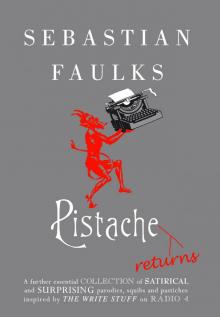 Pistache Returns
Pistache Returns The Girl at the Lion D'Or
The Girl at the Lion D'Or Pistache
Pistache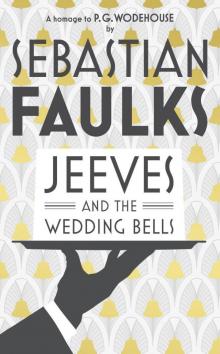 Jeeves and the Wedding Bells
Jeeves and the Wedding Bells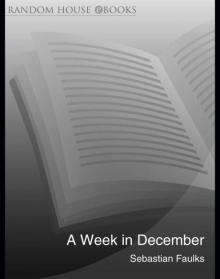 A Week in December
A Week in December The Vintage Book of War Stories
The Vintage Book of War Stories Engleby
Engleby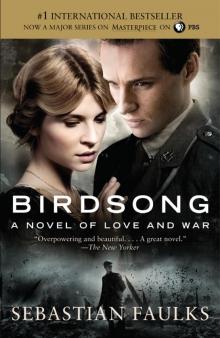 Birdsong
Birdsong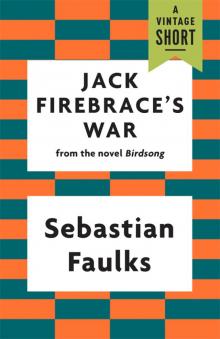 Jack Firebrace's War
Jack Firebrace's War Where My Heart Used to Beat
Where My Heart Used to Beat A Possible Life
A Possible Life The Fatal Englishman: Three Short Lives
The Fatal Englishman: Three Short Lives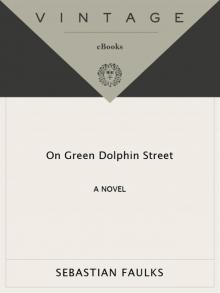 On Green Dolphin Street
On Green Dolphin Street Charlotte Gray
Charlotte Gray A Broken World: Letters, Diaries and Memories of the Great War
A Broken World: Letters, Diaries and Memories of the Great War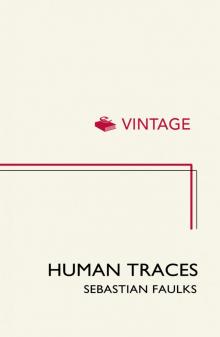 Human Traces
Human Traces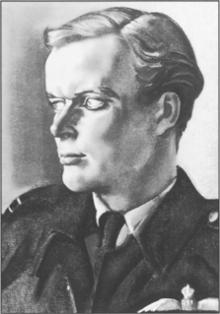 The Fatal Englishman
The Fatal Englishman A Broken World
A Broken World Paris Echo
Paris Echo War Stories
War Stories Girl At the Lion d'Or
Girl At the Lion d'Or